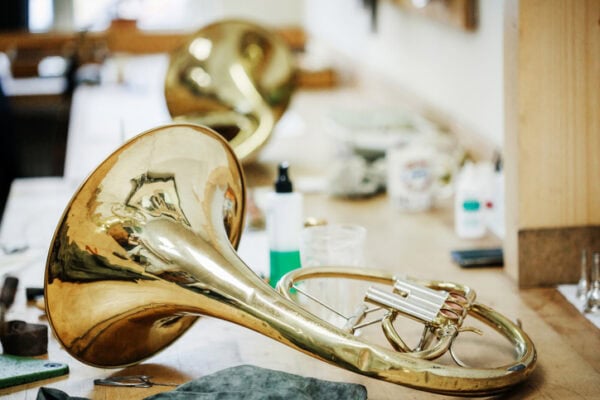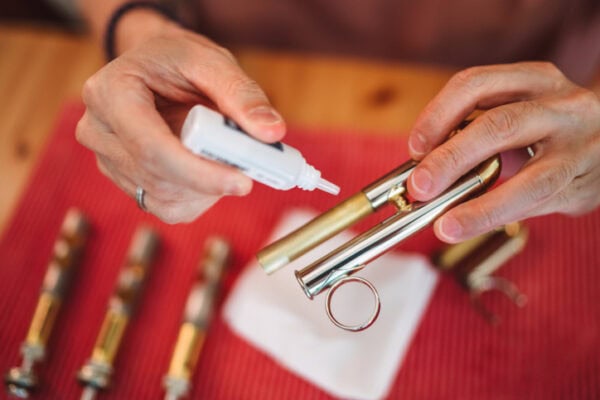/ News Posts / Learning Basic Instrument Repair
Learning Basic Instrument Repair
Guidance for Students
This blog is sponsored by NAfME Corporate member Ferree’s Tools Inc.
When a student’s instrument breaks, bends, and/or gets damaged, we all know it gets sent to our local instrument repair technician. Most schools have had the same repair tech working with their program for years, or maybe an organization they send their injured instruments out to once a month. While these resources are great and we rely on them heavily within our schools, what happens when these repair techs are gone or the music store closes?
The investment you make in your students to learn basic repair may be just the switch they need to fuel their own career goals, showing them that basic repairs can be made without losing your instrument to the shop for weeks on end.
How many of your seniors are nearing graduation and have openly said that college is “just not for them”? This is a great opportunity to introduce them to a career path that involves their musical interest. Becoming an instrument repair tech can be accomplished by two different avenues: an apprentice program at an established repair facility or one of several schools that teach repair. In an apprentice program, often experienced technicians who own their own shop will take a hands-on approach by passing down their skills to a student, and they learn the trade that way. This is a great option for individuals who are eager to jump into the workforce and start their hands-on learning. Another option is one of the many certified instrument repair technician schools. This is an option for the student who is motivated by a structured environment and a faster paced learning experience. These schools differ obviously in classroom size, housing, student services, access to financial aid, etc. Listed below are schools that the NAPBIRT (National Association of Professional Band Instrument Repair Techs) have recommended. NAPBIRT is also a great resource for future repair techs to use during their career.
Minnesota State College Southeast
308 Pioneer Rd.
Red Wing, MN 55066
Phone: 651.385.6300 or 800.657.4849
Fax: 651.385.6377
Instructors: Greg Beckwith, John Huth, Brian DeGayner – bandinstrumentrepair2@southeastmn.edu
Western Iowa Tech Community College
4647 Stone Ave.
Sioux City, IA 51102
Phone: 712.274.6400 in Iowa or Toll Free: 800.352.4649
Fax: 712.274.6412
Instructor: Mark Schmedinghoff – mark_schmedinghoff@witcc.edu
Band Instrument Repair Program
Renton Technical College
3000 NE 4th St.
Renton, WA 98056
Phone: 425.235.2453 Telephone
Fax: 425.235.7832 Fax
Instructor: Jessica Ganska – jganska@rtc.edu
Badger State Repair School
204 W Centralia Street
Elkhorn, WI 53121
Phone: 262.723.4062
Instructor: Ed Strege – MrStregs@aol.com
As current instrument repair techs plan for retirement, not many new techs are stepping into the industry, and these jobs are needed now more than ever. By introducing this career choice to our students, we are securing the future of instrument repair and the future of music education.
Instrument repair doesn’t just have to start in the shop or in the collegiate setting. With Ferree’s Tools it can start right in your classrooms today. Obviously, you’re not going to be removing dents and bending back the bell of your trumpet in between periods. We know no band director has the time or even the space needed for that type of repair in the classroom. But what you may have time for is simple repairs or maintenance work on your instruments that you can learn yourself and also teach the students.
Learning small basic repairs can ensure keeping your students’ instruments in house as long as possible. While a trombone slide bent like a pretzel will definitely need to be shipped out to a professional repair tech, a lose pad or stuck mouthpiece are small repairs that can be learned, taught, and executed right in the classroom when given the proper tools and instruction. At Ferree’s Tools we carry emergency instrument repair kits that are ideal for a beginner repair tech or, for example, a band director who is on the road for a performance and doesn’t have the time to send it in for repair. These kits are equipped with the tools you will need to perform small in-house repairs when needed. Our repair manuals are user-friendly and easy to follow with no repair experience needed. With these manuals, band directors can learn and teach small repairs that will keep the music playing when last minute repairs are needed moments before hitting the field.
Instrument repair techs are the backbone of this industry and need to be celebrated and created to preserve the future of instrumental music in schools. Let Ferree’s Tools be your resource for learning and teaching this waning field to our youth. Together we can make certain that the music keeps playing at your school, and quality repair techs fill the gaps for years to come.
Interested in reprinting this article? Please review the reprint guidelines.
The National Association for Music Education (NAfME) provides a number of forums for the sharing of information and opinion, including blogs and postings on our website, articles and columns in our magazines and journals, and postings to our Amplify member portal. Unless specifically noted, the views expressed in these media do not necessarily represent the policy or views of the Association, its officers, or its employees.
Published Date
February 11, 2025
Category
- Careers
- Innovation
- Lifelong Learning
Copyright
February 11, 2025. © National Association for Music Education (NAfME.org)






